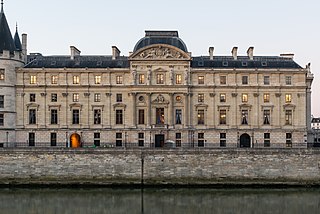A writ of mandamus is a judicial remedy in the English and American common law system consisting of a court order that commands a government official or entity to perform an act it is legally required to perform as part of its official duties, or to refrain from performing an act the law forbids it from doing. Writs of mandamus are usually used in situations where a government official has failed to act as legally required or has taken a legally prohibited action. Decisions that fall within the discretionary power of public officials can not be controlled by the writ. For example, mandamus can not force a lower court to take a specific action on applications that have been made. If the court refuses to rule one way or the other, then a mandamus can be used to order the court to rule on the applications.
In law, certiorari is a court process to seek judicial review of a decision of a lower court or government agency. Certiorari comes from the name of a prerogative writ in England, issued by a superior court to direct that the record of the lower court be sent to the superior court for review. The term is Latin for "to be made more certain", and comes from the opening line of such writs, which traditionally began with the Latin words "Certiorari volumus...".

The Court of Cassation is the supreme court for civil and criminal cases in France. It is one of the country's four superior courts, along with the Council of State, the Constitutional Council and the Jurisdictional Disputes Tribunal.

The Court of Session is the highest national court of Scotland in civil cases. The court was established in 1532 to take on the judicial functions of the royal council. Its jurisdiction overlapped with other royal, state and church courts but as those were disbanded, the role of the Court of Session ascended. The Acts of Union establishing the United Kingdom provided that the court will "remain in all time coming".

A tribunal, generally, is any person or institution with authority to judge, adjudicate on, or determine claims or disputes—whether or not it is called a tribunal in its title. For example, an advocate who appears before a court with a single judge could describe that judge as "their tribunal". Many governmental bodies are titled "tribunals" to emphasize that they are not courts of normal jurisdiction. For instance, the International Criminal Tribunal for Rwanda was a body specially constituted under international law; in Great Britain, employment tribunals are bodies set up to hear specific employment disputes.

The Securities and Exchange Board of India (SEBI) is the regulatory body for securities and commodity market in India under the administrative domain of Ministry of Finance within the Government of India. It was established on 12 April 1988 as an executive body and was given statutory powers on 30 January 1992 through the SEBI Act, 1992.

The Supreme Court of Maryland is the highest court of the U.S. state of Maryland. The court, which is composed of one chief justice and six associate justices, meets in the Robert C. Murphy Courts of Appeal Building in the state capital, Annapolis. The term of the Court begins the second Monday of September. The Court is unique among American courts in that the justices wear red robes.
The court system of Canada is made up of many courts differing in levels of legal superiority and separated by jurisdiction. In the courts, the judiciary interpret and apply the law of Canada. Some of the courts are federal in nature, while others are provincial or territorial.

The Judiciary of the Hong Kong Special Administrative Region is the judicial branch of the Hong Kong Special Administrative Region. Under the Basic Law of Hong Kong, it exercises the judicial power of the Region and is independent of the executive and legislative branches of the Government. The courts in Hong Kong hear and adjudicate all prosecutions and civil disputes, including all public and private law matters.

The courts of Scotland are responsible for administration of justice in Scotland, under statutory, common law and equitable provisions within Scots law. The courts are presided over by the judiciary of Scotland, who are the various judicial office holders responsible for issuing judgments, ensuring fair trials, and deciding on sentencing. The Court of Session is the supreme civil court of Scotland, subject to appeals to the Supreme Court of the United Kingdom, and the High Court of Justiciary is the supreme criminal court, which is only subject to the authority of the Supreme Court of the United Kingdom on devolution issues and human rights compatibility issues.

The Supreme Court of Nepal is the highest court in Nepal. It is designated as the court of record by the Constitution of Nepal. It has appellate jurisdiction over decisions of the seven High Courts and extraordinary original jurisdiction. The court consists of twenty judges and a Chief Justice.
A quasi-judicial body is a non-judicial body which can interpret law. It is an entity such as an arbitration panel or tribunal board, which can be a public administrative agency but also a contract- or private law entity, which has been given powers and procedures resembling those of a court of law or judge and which is obliged to objectively determine facts and draw conclusions from them so as to provide the basis of an official action. Such actions are able to remedy a situation or impose legal penalties, and they may affect the legal rights, duties or privileges of specific parties.

In most legal jurisdictions, a supreme court, also known as a court of last resort, apex court, and highcourt of appeal, and court of final appeal, is the highest court within the hierarchy of courts. Broadly speaking, the decisions of a supreme court are binding on all other courts in a nation and are not subject to further review by any other court. Supreme courts typically function primarily as appellate courts, hearing appeals from decisions of lower trial courts, or from intermediate-level appellate courts. A supreme court can also, in certain circumstances, act as a court of original jurisdiction.

The Court of Appeals is an appellate collegiate court in the Philippines. The Court of Appeals consists of one presiding justice and sixty-eight associate justices. Pursuant to the Constitution, the Court of Appeals "reviews not only the decisions and orders of the Regional Trial Courts awards, judgments, final orders or resolutions of, or authorized by administrative agencies exercising quasi-judicial functions mentioned in Rule 43 of the 1997 Rules of Civil Procedure, plus the National Amnesty Commission and the Office of the Ombudsman". Under Republic Act No. 9282, which elevated the Court of Tax Appeals to the same level of the Court of Appeals, en banc decisions of the Court of Tax Appeals are subject to review by the Supreme Court instead of the Court of Appeals. Added to the formidable list are the decisions and resolutions of the National Labor Relations Commission which are now initially reviewable by the Court of Appeals, instead of a direct recourse to the Supreme Court, via petition for certiorari under Rule 65.
The Judiciary of Vermont is the state court system of Vermont, charged with Vermont law.
The Customs, Excise and Service Tax Appellate Tribunal (CESTAT) is an Indian quasi-judicial body that hears appeals against orders and decisions passed under the Customs Act, 1962 and Central Excise Act, 1944 as amended from time to time. It was constituted as Customs, Excise and Gold (Control) Appellate Tribunal (CEGAT) under section 129 of Customs Act, 1962, as amended by section 50 and the Fifth Schedule of Finance Act, 1980. These amendments became effective from 11 October 1982 and the Tribunal was also constituted on the same date. Its initial mandate was under Customs Act, 1962, Central Excise Act, 1944 and Gold (Control) Act, 1968. Service tax was introduced by Chapter V of Finance Act, 1994 and this also was added to the jurisdiction of CEGAT. Accordingly, the name of the Tribunal was changed to Customs, Excise and Service Tax Appellate Tribunal (CESTAT) by amending section 129 of the Customs Act, by section 119 of Finance Act, 2003, effective from 14 May 2003.
The Judiciary of California or the Judicial Branch of California is defined under the California Constitution as holding the judicial power of the state of California which is vested in the Supreme Court, the Courts of Appeal and the Superior Courts. The judiciary has a hierarchical structure with the California Supreme Court at the top, California Courts of Appeal as the primary appellate courts, and the California Superior Courts as the primary trial courts.
Tribunals in India are quasi-judicial bodies for settling various administrative and tax-related disputes, including matters that are under the jurisdiction of Central Administrative Tribunal (CAT), Income Tax Appellate Tribunal (ITAT), Customs, Excise and Service Tax Appellate Tribunal (CESTAT), National Green Tribunal (NGT), Competition Appellate Tribunal (COMPAT) and Securities Appellate Tribunal (SAT), among others.

The National Company Law Appellate Tribunal (NCLAT) is a tribunal which was formed by the Central Government of India under Section 410 of the Companies Act, 2013. The NCLAT was formed as a body with an appellate jurisdiction at the same time when NCLT was established as a major reform as per powers granted to the Ministry of Corporate Affairs in India.
Appellate Tribunal for Electricity is created as a statutory and autonomous body under the Electricity Act, 2003 to hear complaints, appeals or original petitions against the orders of the State Regulatory Commission, The Central Regulatory Commission, Joint Commission or the Adjudicating officer.











